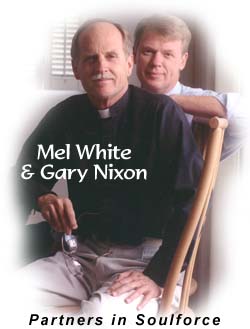New York Times, September 5, 1999
By GUSTAV NIEBUHR
If all goes as agreed, the Rev. Mel White, an outspoken supporter of gay rights, will take 200 people to Lynchburg, Va., next month, to meet with the Rev. Jerry Falwell, an outspoken critic of homosexual activity, and 200 people he has invited, to talk about the issue dividing them.
Such an encounter will certainly be unusual, perhaps even a first in the long, contentious debate over gay rights. "I believe we’re going," White said, "and we’re going in love and peace."
The idea for the gathering, he said in a telephone interview, is to try to take the harshness out of the debate.
Mark DeMoss, a spokesman for Falwell, said the conservative Baptist minister was "committed" to the gathering, having agreed to it in August when he met with White at the latter’s request. The event is set for Oct. 23, at Liberty University, where Falwell is chancellor, and "could be anything from a forum to a meal of some kind," DeMoss said.
DeMoss added, however, that Falwell would not compromise on his conviction that the Bible condemns homosexual activity.
"I think one of the themes is going to be, while we’re going to disagree about homosexuality and what the Bible says about homosexuality, violence going in either direction is wrong and we ought to condemn it," DeMoss said.
That this event is even planned owes something to White’s unusual resume, which includes a professional acquaintance with Falwell.
For many years, White, as a seminary professor, television and film producer and book author, worked closely with leading religious conservatives, ghost-writing several books, including Falwell’s autobiography, "Strength for the Journey" (Simon and Schuster, 1987).
 But six years ago, White, who had been married, announced that he was gay, and that he had come to terms with it after years of inner struggle, including efforts to change through counseling, prayer and electric shock. He described the process in his autobiography, "Stranger at the Gate: To Be Gay and Christian in America" (Simon and Schuster, 1994).
But six years ago, White, who had been married, announced that he was gay, and that he had come to terms with it after years of inner struggle, including efforts to change through counseling, prayer and electric shock. He described the process in his autobiography, "Stranger at the Gate: To Be Gay and Christian in America" (Simon and Schuster, 1994).
More recently he has been a chairman of Soulforce Inc., an ecumenical group that tries to apply Gandhi’s and the Rev. Dr. Martin Luther King Jr.’s principles of nonviolence to advance gay rights. "We believe that the gay community hasn’t discovered nonviolence in its powerful, historic sense," he said.
White and Falwell met on Aug. 17, two months after White began writing open letters to Falwell, posted on Soulforce’s Internet site, www.Soulforce.org, complaining about language in fund-raising letters by Falwell’s organizations. White cited several lines, among them one from a 1996 fund-raising letter that said homosexuals "want total political approval and taxpayer money for their perverted political and social programs."
In the August meeting, according to DeMoss, who was present, Falwell told White that he "was willing to take a more careful look" at what went out under his name, but "without compromising what he believes biblically."
Falwell also told White that he had received threats from some gay-rights supporters in the past, causing Falwell concern for his safety, DeMoss said. At that point, he added, both men agreed that any kind of violence on this issue was wrong.
Since agreeing to the gathering, Falwell has come under criticism, particularly from fellow religious conservatives. "He’s taking heat from both sides," DeMoss said.
White said he already had a list of 200 people to take to Lynchburg: gay men, lesbians, and their friends and relatives. He said he is distributing a written pledge to participants, in the style of similar pledges used during the civil-rights movement, asking those going with him to promise to refrain from violent thoughts, words and actions.
Churches in Lynchburg have called to offer hospitality, he said.
"To me, it’s a historic event if it comes off, even if Jerry lectures us," White said. "If Jerry invites us to dinner just to preach to us, he’s invited us to dinner. And he and his 200 people will see we do not have horns."